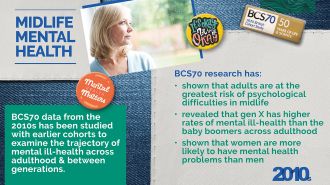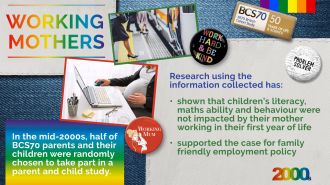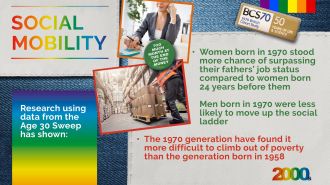
- Our studies
- Our research
- Publications and resources
- Data access and training
- About
- News
- Events
- Get in touch
- Join our mailing list

Welcome to our news and blogs section. Here you’ll find the latest developments and insights from across our longitudinal studies.
Young people from more deprived neighbourhoods have to wait up to 15 minutes longer for accident and emergency (A&E) treatment than their more advantaged peers with similar healthcare needs, according to new findings from Next Steps.

People who remain members of clubs and societies throughout their lives tend to have a higher daily step count and exercise more in their mid-40s.

Up to one in five adults with a history of poor mental health reported they were ‘much worse off’ financially a year into the COVID-19 pandemic, compared to one in ten of those who had never had psychological problems in adulthood.

The 1970 British Cohort Study (BCS70) has been an important source of evidence on midlife mental health, helping to improve our understanding about why middle age is such a vulnerable period for adults.

Celebrating 50 years of the 1970 British Cohort Study – as we conclude our exploration of BCS70 in the 2000s, we take you on an animated tour from the start of the new millennium.

Baby Boomers and Generation X are at the greatest risk of mental ill-health in middle age, finds new research by UCL.

The 1970 British Cohort Study (BCS70) has been an important resource for research into the potential impacts on children when mothers return to work.

In the BCS70 Age 34 Sweep, half of cohort members with children aged 16 and under were randomly chosen to take part in a special study.

Celebrating 50 years of the 1970 British Cohort Study – BCS70 has been one of the leading sources of evidence on social mobility, informing a series of impassioned academic debates on this topic.
In honour of the 50th anniversary of the 1970 British Cohort Study, this scientific conference will showcase the latest cutting-edge research using CLS cohort data.

Over the years, men who waited until their mid-20s to have their first child tended to report the best health in middle age, compared to those who started a family earlier. But, more recently, those who delayed fatherhood until their mid-30s appeared to be the healthiest in midlife.

Children whose mothers smoked during pregnancy are not born predisposed to smoking through absorbing nicotine in the womb, a study has found.

Among the Baby Boomers and Generation X, people who had higher levels of emotional wellbeing during childhood and adolescence were more likely to report being satisfied with life when they reached adulthood.
Ryan Bradshaw
Senior Communications Officer
Phone: 020 7612 6516
Email: r.bradshaw@ucl.ac.uk